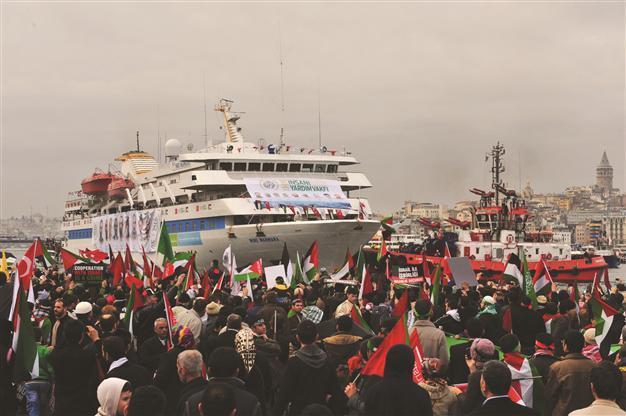Israelis think apology to Turkey ‘a mistake’
ISTANBUL

Nine Turkish nationals were killed by Israeli soldiers who boarded the Mavi Marmara vessel in May 2010. DAILY NEWS photo, Emrah GÜREL
A large majority in Israel, 71 percent, believe it was a mistake to apologize to Turkey for the killing of nine Turkish nationals by Israeli soldiers when they boarded Mavi Marmara, a humanitarian aid ship bound for Gaza in May 2010, according to a recently conducted poll.
Professor Efraim Inbar, the director of the Begin-Sedat Center for Strategic Studies that commissioned the poll, said 55 percent of Israelis believe Turkey’s global and regional ambitions are behind the deterioration in relations. “Israel-bashing brings Turkey popularity in Iran and the Islamic world,” he said yesterday at a panel organized by Turkish Policy Quarterly and the Friedrich Naumann Foundation.
Little attribution to anti-SemitismA total of 24 percent believe domestic reasons are the cause of the souring of relations, while only 8 percent attribute it to anti-Semitism, according to Inbar, who said the Israeli public analyzed Turkish-Israeli relations from a realpolitik lens.
The Israeli apology is irrelevant to the future of relations because as long as Turkey is not interested in having good relations with Israel not much will change, said Inbar.
Nimrod Gore, the chairman of Mitvim, the Israeli Institute for Regional Foreign Policies, used more optimistic rhetoric, saying the Israeli apology had opened channels for dialogue. But he also said the lack of progress in normalizing ties has fueled skepticism among the Israeli public about Turkey’s willingness to reconcile with Israel. Negotiations are stuck on the issue of compensation, but the Israeli public needs to see some visible steps from Turkey to increase their trust in the reconciliation process. One such step could be the exchange of ambassadors, according to Goren.
‘No normalization in context of recent protests’Journalist Kadri Gürsel said “normal” normalization is no longer possible in the context of recent protests in Turkey. Recalling statements from Turkish officials accusing Jewish lobbies of being behind mass demonstrations in Turkey, Gürsel said progress in relations with Israel was difficult as it would contradict the government’s rhetoric.
Polemic on the PKK issueThe panel saw a heated debate when the Kurdish issue came to the agenda, as Inbar said the Israeli stance on that issue depended on Turkey. “We may decide to do things we have refrained from so far.”
When he was asked to clarify, he said preferred not to. He was compelled to elaborate, however, when he was criticized by a member of the audience who said his statement would be perceived by the Turkish public as support for the outlawed Kurdistan Workers’ Party (PKK) and as such it was “idiotic” rhetoric and bad public diplomacy.
While Inbar responded by saying the PKK was considered a terror organization by Israel, he added that Turkey supported Hamas, which is an organization dedicated to the destruction of Israel. By supporting Hamas, Turkey is seen as a hostile country in the eyes of Israelis, who won’t turn the other cheek when they receive a slap to the face, according to Inbar.
Ohad Avidan-Kaynar, the Israeli deputy counsel general, said during the discussions that the statements of the panelists should not be taken as the official views of the Israeli state. He then left the room toward the end, when Inbar criticized the Palestinian position, likening it to Nazi policies, saying the Palestinians wanted a state without Jews.
